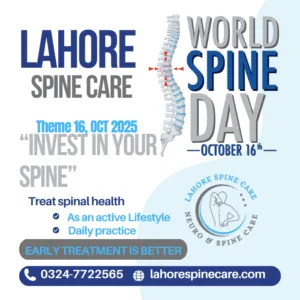
Essential Tips for Maintaining Spine Health During Ramadan Fasting
✅ “Essential Tips for Maintaining Spine Health During Ramadan Fasting” Ramadan is a blessed month
Obesity is not only an issue of weight; it is a multifaceted issue that involves the whole body and the spine in particular. Obesity and spine disorders are connected in a complex manner since biomechanical, inflammatory, and metabolic factors are involved. Knowledge of this relationship is therefore important in the prevention and management of spine-related disorders. In this blog, we will look at the effects of obesity on the spine and ways to prevent them How Obesity Affects the Spine
Table of Contents
ToggleAmong the most obvious effects of obesity on the spine is mechanical load The following is a brief explanation of the effects of obesity on the spine. Obesity creates an extra load on the spine and the structures that surround it. The vertebrae, the intervertebral discs and the ligaments are all placed under more pressure, and this can lead to more stress and strain. This increased load can contribute to conditions such as: This increased load can contribute to conditions such as:
Degenerative Disc Disease: The discs between the vertebrae act as cushions and can wear out faster if the person is overweight, causing the patient to have a hard time moving around.
Spinal Osteoarthritis: The facet joints in the spine can become hypertrophic and develop osteoarthritis when stress is placed on them, leading to pain and stiffness.
Herniated Discs: Obesity has been found to raise the chances of discs herniating, where the inner core of the disc, which has a gel-like consistency, bulges out and puts pressure on spinal nerves.
Obesity, as a result, causes alterations in the alignment of the spine. Obesity, particularly in the abdominal area, results in a forward displacement of the body’s centre of gravity and hence poor posture and increased lumbar lordosis. This misalignment can exacerbate existing spine issues and contribute to: This misalignment can exacerbate existing spine issues and contribute to:
Chronic Back Pain: Abnormal position of the spine and improper positioning of the body affect the muscles and ligaments, causing chronic pains.
Scoliosis: While not as frequent as in mild to moderate obesity, extreme obesity can either cause or exacerbate scoliosis, which is a sideways curvature of the spine.
Scoliosis: While not as frequent as in mild or moderate obesity, severe obesity can cause scoliosis, a disorder that affects the sideways curvature of the spine.
The chronic low-grade inflammation is also linked to obesity and might have implications on spine health. The fat tissue itself secretes inflammatory cytokines that may lead to inflammation in other tissues of the body. This inflammation can exacerbate spine disorders by: This inflammation can exacerbate spine disorders by:
Accelerating Degeneration: Lumbar discs and joints are also affected by inflammatory cytokines since they also enhance the rate of degeneration.
Promoting Pain: Inflammation can modulate pain and is implicated in conditions such as chronic low back pain.
Obesity is usually accompanied by metabolic syndrome, which is characterised by such diseases as diabetes, hypertension, and high cholesterol. These metabolic issues can further complicate spine health by: These metabolic issues can further complicate spine health by:
Impaired Healing: Such diseases as diabetes can affect the body’s healing process, which makes it difficult for the spine to recover from an injury or surgery.
Increased Risk of Comorbidities: Metabolic syndrome can contribute to other diseases that may have an impact on the spine in one way or the other.
As for the problem of obesity and spine disorders, both primary and secondary measures should be taken. Here are some effective approaches: Here are some effective approaches:
It is also important to note that being overweight is dangerous to the spine. Several mechanical stresses on the spine can be relieved through weight loss in conjunction with diets and exercising. It is also important to know that weight loss can also decrease inflammation and increase one’s health.
Exercise: Aquatic exercises or cycling, for instance, are good for the muscles that surround the spine, but they do not strain the spine.
Nutrition: The elimination of foods that cause inflammation in the body and the focusing on foods that have anti-inflammatory properties, including fruits, vegetables, and whole grains, can assist in lowering inflammation in the body.
It is important to work on the position of the body and the way the spine is used during work. Small changes such as sitting or standing with a straight back and using the right furniture can go a long way.
If obesity has caused severe spine disorders, then medical or surgical treatments may be required. Treatments can include:
Physical Therapy: Specific exercises can be recommended to a patient in order to make the muscles surrounding the spine more robust and to increase the range of motion.
Medications: Symptomatic control includes pain and anti-inflammatory medications.
Surgery: In cases of severe pain, spinal fusion or disc replacement may be recommended.
The correlation between obesity and spine disorders shows the necessity of a comprehensive approach to people’s well-being. This paper aims to show that through knowledge of how excess weight affects the spine and through proper weight control and general health improvement, one can greatly minimise the chances of developing spine-related complications. Obesity and spine health are two chronic conditions that need a long-term approach to treatment and management for the best results. However, the responsibility to remain updated and active in this area of study is vital to ensuring the health of the spine and the rest of the body.

✅ “Essential Tips for Maintaining Spine Health During Ramadan Fasting” Ramadan is a blessed month

Turmeric, also known as the “golden spice”, has been a part of traditional medicine and

The Best Spine Treatment Services of DHA Phase 6, Lahore. Most of us are used

On the 16th of October, the world unites in order to celebrate World Spine Day,

The Spencer Technique is one of many options of treatments that physical therapists and osteopathic

How to choose the right shoe for spine health is more important for spine health
LAHORE SPINE CARE is proudly powered by WordPress